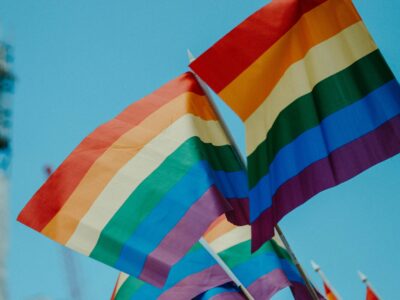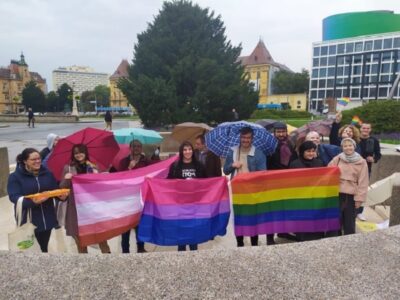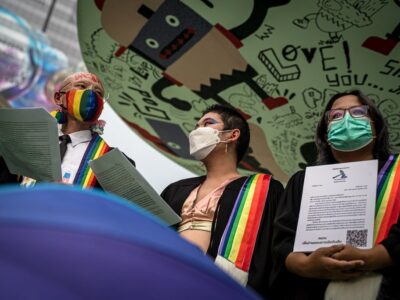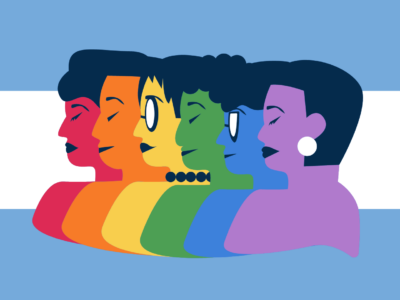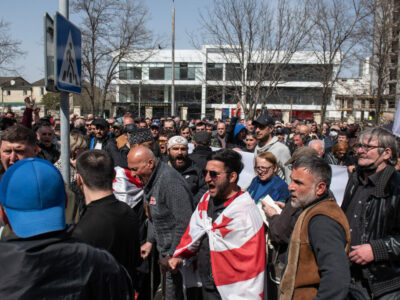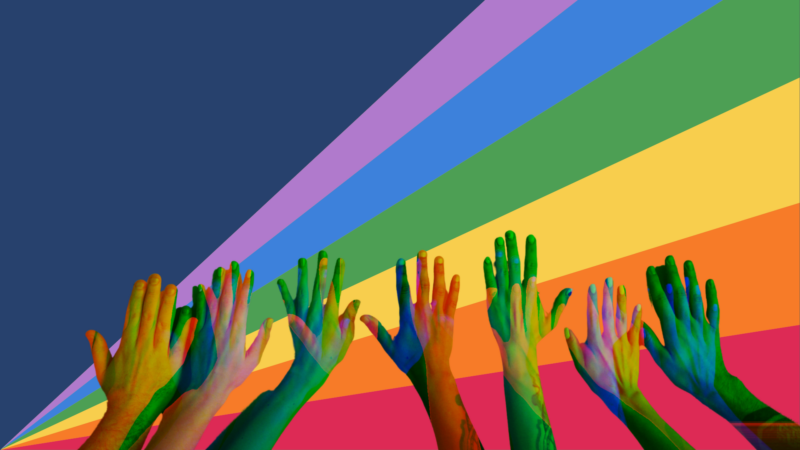
Ever since 1999 when former US President Bill Clinton declared June “Gay and Lesbian” Pride Month in the US, nations around the world have used this month to celebrate those who have historically been marginalized due to their sexual and gender expression. Our collective understanding of gender and sexuality has expanded since the late ’90s, and now we not only celebrate gay and lesbian individuals but also bisexual, transgender, intersex, asexual, queer folks, and others who don’t fit within strict heteronormative ideals.
For lesbian, gay, bisexual, transgender, and queer (LGBTQ+) people, being open about their sexuality or gender expression can often be a dangerous endeavor that may expose them to discrimination violence, oppression, abuse, or stigma. Research shows that LGBTQ+ people are at increased risk for violence, sexual assault, and discrimination due to their identity — on both a micro-level with abuse from individuals and a state-level with systematic obstacles to their basic rights. This map by Human Rights Watch (HRW) details state-level laws in different countries that harm LGBTQ+ people and prevent them from equally accessing basic rights and services.
The queer community has had a particularly difficult two years with the onset of COVID-19 in 2020 and waves of increased marginalization that came with it. Annual PRIDE marches were canceled. The clubs and spaces where queer folks may find support and like-minded individuals were shut down, effectively forcing many people back into the closet as their main social outlets were ripped away. For those living with unsupportive family members, this often meant hiding and suppressing their identity — a choice that can negatively impact people’s mental health. Online channels for LGBTQ+ communication were also wiped out in China, just as LGBTQ+ people and women were scapegoated for the country’s declining birth rate and other social problems.
Increasing global conservatism is infringing on hard-won rights the LGBTQ+ community has fought for. But the community is not taking these infractions lying down. All over the world, LGBTQ+ individuals and allies took to the streets to resist authoritarianism and protect their rights. From Azerbaijan and Turkey to Thailand and Brazil, protests, awareness campaigns, and acts of civil disobedience signaled that queer folks will not stand for continued marginalization.
Some anti-LGBTQ+ governments try to diminish local queer activist movements by framing them as new “Western ideals,” that are part of the modern-day “woke culture” in reality, throughout history, most cultures around the world independently developed a range of nuanced sexualities and expanded gender expressions. In North American Indigenous communities there are two-spirit people, a term for those who identify beyond the male-female gender binary. In Indonesia, there are the waria, a term for people who are born male but live along a continuum of gender identity. Different groups in the African continent also had a wide range of sexual and gender expressions before they were forced to abandon these traditions under Western colonial rule.
But even as some LGBTQ+ groups fight for their rights and identities, there have also been cases of progress and increasing tolerance. Argentina is including questions on gender identity and ethnicity on its census this year, which is a major step in getting LGBTQ+ folks equal rights and access in the public sphere. Jowelle De Souza was the first openly transgender woman to serve in Trinidad and Tobago's parliament when she was appointed as a temporary senator for a day.
Global Voices is partnering this year with the Berlin-based Disruption Network Lab to explore the issues of transitioning and hear voices from Ukraine, Taiwan, Western Europe, and the US who share their challenges and achievements in their journey towards visibility, equal rights, and artistic expression.
For other resources about LGBTQ+rights and identities, see this map created by PBS exploring the range of historic gender expressions around the world.
To read more about the state of LGBTQ+ rights in 2022, see our coverage below.
Stories about Pride 2022: Community resistance
Transgender women are despised, like the Virgin Mary in her day
"I am a mother raising her child. There was no conception in my womb, but for me, it's really a miracle."
Carving a path for LGBTQ+ people through shame, homophobic violence, and bans
People lean towards embracing dignity and pride for what they are. Being “Kazakh” and being “gay” seemed to be mutually exclusive, but we become aware of our rights, our self-worth.
Brazilians debate questions on sexuality and gender identity before 2022 census
After a court ruling required the inclusion of these questions in the census - to begin in August - another court ruling suspended it, arguing that it would be practically difficult.
In Turkey, a song about love between two men draws backlash
The song has also triggered a harsh response from the country's conservative population, who claim the video has no place in a country like Turkey.
The poet's mindset as a tool against transphobia: An interview with US veteran and trans activist Drew Pham
Global Voices talked to Drew Pham, a former US Afghan War veteran, who shares her experience as a trans woman, but also a poet, sex artist and educator.
Trans women in the sex industry in Azerbaijan: Is it a free choice or just the illusion of choice?
In countries like Azerbaijan, where trans women end up as sex workers, legalization of sex work is seen as a solution to the problem.
Why gender dissent and queer sci-fi can challenge surveillance: An interview with artist Shu Lea Cheang
Cyberpunk artist Shu Lea Cheang explores the issues of surveillance through the prism of queer activism, sexual dissident history and data art installation to challenge the public's acceptance of control.
Istanbul police violently break up PRIDE March and arrest over 300 people
This year marks the 30th anniversary of Istanbul LGBT+ Pride Week. While local authorities banned all PRIDE events, protestors still took to the streets, marched, and chanted slogans.
I did not come to flirt, but only to buy lemons
"I hope the day comes when buying lemons is just that and the shop is not another place where individuals are treated according to what they are supposed to have under their skirts."
Meet the team behind the Bangkok Pride Parade
After a hiatus of nearly two decades, the Pride Parade returned to Bangkok, Thailand, on June 5, drawing crowds of LGBTQ+ community members, sex workers, feminists, political dissidents, and corporate advocates.
In a post-COVID workplace, is a ‘professional’ dress code still relevant?
Adopting a gender-neutral, less restrictive, and diverse dress code style will open the doors of opportunity for employees coming from underrepresented groups such as people with disabilities and LGBTQ+ employees.
Equality for transgender Ukrainians: A long way to go, now complicated by the war
Russia's invasion has affected the life of the Ukrainian transgender community: many have lost jobs, access to safe medical care. They are also exposed to humiliating gender questioning.
Croatian LGBTQ+ college student association normalizes differences at Zagreb Law Faculty
In less than two years, Croatian gay–straight alliance student association ZA-Pravo has gained the attention of LGBTQ+ students and the general public by creating a safe space for all.
What South Asians in the US are saying about abortion and LGBTQ+ rights
As the US is engaging in a political and cultural war about abortion and LGBTQ+ rights, the large South Asian community living in the country comments on the situation.
‘We’re also taking part in this war,’ says Ukraine's LGBTQ+ community
Though sexual diversity in Ukraine is not outlawed (it's legal since independence in 1991), the LGBTQ+ community has long been stigmatized. Now they are sacrificing their lives for their homeland.
Chinese nationalists scapegoat feminists and LGBTQ+ people for the declining birth rate
"This government is so consistent in treating women's body as a tool for its economic development goals, and in violating women's reproductive choice and bodily autonomy."
Activists rally for marriage equality in Thailand
A petition was launched proposing amendments to the Civil and Commercial Code to allow marriage registration between two people of any gender.
Argentina's census to include questions on gender identity and ethnicity
With its new census, Argentina takes a step forward to recognize different ethnic and gender identities.
Twenty far-right activists convicted over July 5 attack on journalists
Tbilisi City Court has convicted 20 far-right activists for the attacks on at least 53 media workers and others during the aborted Pride March in Tbilisi on 5 July 2021.
Unpacking India's struggle with recognizing same-sex marriage
Although India decriminalized consensual same-sex activity between adults in 2018, LGBTQ+ activists are still fighting for their rights because same-sex marriage is not recognized under Indian law.
Nepal's transgender activist Bhumika Shrestha receives international recognition
Bhumika Shrestha received the 2022 International Women of Courage (IWOC) Award from the US government in recognition of her work for the LGBTQ community of Nepal for the past 15 years.




